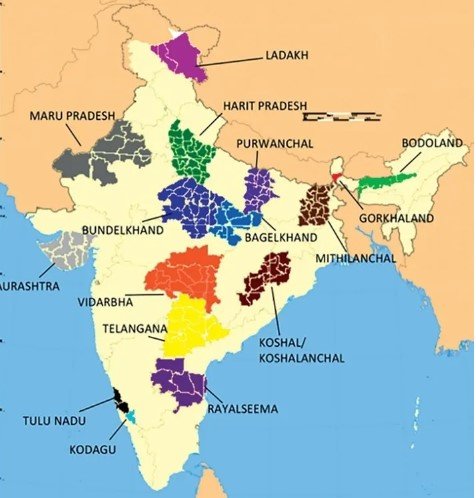Regionalism, the advocacy for regional interests over national concerns, can pose significant challenges to national integration and governance. These challenges can manifest in various forms, affecting political stability, economic development, social cohesion, and administrative efficiency. Here’s a detailed analysis of the challenges posed by regionalism:
1. Political Challenges
a. Fragmentation of Political Authority:
-
- Rise of Regional Parties: The emergence of strong regional parties can lead to fragmented political landscapes, making it difficult to form stable central governments. Coalition governments often have to accommodate diverse regional interests, leading to policy paralysis or compromises.
- Policy Conflicts: Regional parties may prioritize local issues over national concerns, resulting in conflicts between regional and national policies. This can hinder the implementation of cohesive national strategies.
b. Secessionist Movements:
-
- Demands for Autonomy: In extreme cases, regionalism can fuel secessionist movements, where regions demand greater autonomy or even independence. This can threaten the territorial integrity of the nation. E.g., Punjab (Khalistan movement) and the Northeast (Naga insurgency, Bodoland movement), threatening national unity and territorial integrity.
- Internal Conflicts: Secessionist movements can lead to internal conflicts, civil unrest, and violence, undermining national stability and security.
2. Economic Challenges
a. Uneven Development:
-
- Resource Allocation: Regionalism can lead to demands for preferential allocation of resources to certain regions, causing imbalances and perceptions of inequity among other regions. This can hinder balanced economic development.
- Economic Disparities: Focus on regional development can exacerbate economic disparities between regions, leading to tensions and competition for national resources and investments.
b. Infrastructure Development:
-
- Localized Priorities: Regional governments may prioritize local infrastructure projects over national projects, affecting the overall infrastructure development strategy of the country.
- Inefficient Utilization: Conflicting regional interests can lead to inefficient utilization of resources and infrastructure, impacting economic growth and integration.
3. Social Challenges
a. Cultural and Ethnic Divisions:
-
- Identity Politics: Regionalism often emphasizes local identities, cultures, and languages, which can lead to the marginalization of minority groups within regions. This can foster ethnic/Linguistic Conflicts and social divisions. Manipur (Kuki-Meitei conflict), Assam (Bodo-Bengali clashes), and Sri Lanka (Tamil minority issue).
- Social Cohesion: Emphasis on regional identity over national identity can weaken social cohesion, creating a fragmented society with divided loyalties.
b. Migration and Settlement Issues:
-
- Inter-Regional Migration: Regionalism can lead to resistance against migration from other parts of the country, creating barriers to the free movement of people and labor. This can affect national integration and economic efficiency.
- Discrimination: Migrants from other regions may face discrimination and hostility, leading to social unrest and conflicts.
4. Administrative Challenges
a. Governance Efficiency:
-
- Decentralization vs. Centralization: Balancing the need for regional autonomy with effective central governance is challenging. Excessive decentralization can weaken central authority, while over-centralization can stifle regional aspirations.
- Policy Implementation: Conflicting regional interests can impede the implementation of national policies and programs, reducing governance efficiency and effectiveness.
- Politicization of Bureaucracy: Demands for representation and autonomy can politicize bureaucracy along regional lines.
b. Coordination and Cooperation:
-
- Inter-Governmental Coordination: Effective governance requires coordination between central and regional governments. Regionalism can lead to a lack of cooperation, resulting in inefficiencies and delays in policy implementation.
- Administrative Fragmentation: The proliferation of regional administrative bodies can lead to administrative fragmentation, complicating governance and service delivery.
5. National Security Challenges
a. Internal Security Threats:
-
- Insurgency and Terrorism: Regions with strong separatist movements can become hotspots for insurgency and terrorism, posing serious threats to national security.
- Border Security: Regionalism in border areas can complicate national border security strategies, making it challenging to address cross-border issues effectively.
Implications of Regionalism:
- Political Stability: Rise of regional parties leads to fragmented mandates, frequent elections, and unstable coalition governments at the Center, affecting long-term policy planning.
- Law and Order Challenges: Regionalism fuels protests and law and order issues, eroding state authority and sometimes misusing central forces.
- External Interference: Regions with cross-border ties may become vulnerable to external influence, posing security challenges.
Balancing Act:
- Strengthen Federalism: Accommodate diverse regional interests without compromising national integrity.
- Promote Cultural Exchange: Celebrate regional diversity while fostering a sense of national identity.
- Inclusive Policies: Address regional disparities through inclusive policies.
Conclusion
Regionalism poses multifaceted challenges to national integration and governance, impacting political stability, economic development, social cohesion, administrative efficiency, and national security. Addressing these challenges requires a delicate balance between accommodating regional aspirations and maintaining national unity. Policies promoting equitable development, inclusive governance, and dialogue between regional and national stakeholders are essential to mitigate the adverse effects of regionalism and foster a cohesive and integrated nation.


